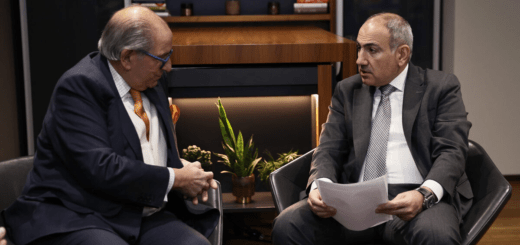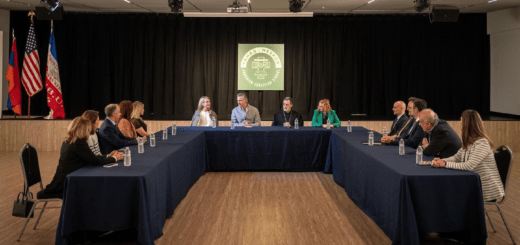Silencing the Church and Dividing a Nation

In Trying to Weaken the Armenian Apostolic Church, Armenia’s Leadership may be Undermining the Last Institution Still Holding the Armenian World Together
BY ARDASHES “ARDY” KASSAKHIAN

Armenia’s Prime Minister Nikol Pashinyan makes little effort to hide his hostility toward the Armenian Apostolic Church, driving a wedge between the people he is supposed to lead and the institution that has held the nation together for nearly two millennia.
Cloaked in the usual populist propaganda language of “reform” and “transparency” that brought him to power, his campaign has quickly unraveled into a calculated attempt to bring the Church under his control.
What began as political rhetoric has become a purge-by-policy: clergy arrested under dubious legal charges, smear campaigns deployed to discredit religious leaders, arresting anyone who criticizes his stance, and a steady effort to strip the Church of its autonomy and moral standing.
It is abundantly clear that none of this is about modernization or morals. It’s simply about control.
It can be argued that every iteration of the Armenian government since the collapse of the Soviet Republic has used state institutions as weapons of intimidation. But few have done it with such ferocity for self-preservation as this administration. From tax probes to legislative proposals, from vague accusations of “sabotage” to public humiliation of the Catholicos himself, the message is unmistakable: get in line or get out of the way.
Pashinyan’s war on the Church reached a fever pitch when he accused it of undermining the state—language ripped straight from the Soviet playbook.
That’s no coincidence. The Soviet Union knew this script well. In the 1930s, Stalin’s regime executed Catholicos Khoren I, shuttered churches, and criminalized public expressions of faith. Soviet propaganda reinforced the message by portraying clergy as traitors and nationalists—subversives cloaked in vestments. Films like “The Fishermen of Sevan” (1939) pushed the idea that priests were little more than agents of the Dashnak party, enemies of the people disguised as men of God. The Prime Minister seems to be just dusting off the old reels and rolling out old tropes.
Even more disturbing? His narrative now echoes the talking points of Azerbaijan. For years, the Azerbaijani regime has smeared the Armenian Church as an incubator of nationalism and extremism. It has accused clerics of inciting hate and painted the Church as a threat to peace. Now, from the halls of Baku to the offices of Yerevan, that message is converging: delegitimize the Church, discredit its leaders, and sever it from its people.
In doing so, Pashinyan weakens a vital spiritual institution and plays into the hands of a hostile neighbor actively working to erase Armenian heritage altogether. What Azerbaijan seeks through erasure and denial, Pashinyan risks achieving through alienation and internal collapse. One can only speculate what is at the root of this public antagonism against the clergy and the leaders of the church, but it does make one wonder why this strategy is so much in step with what agents in Baku are trying to do to discredit one of the world’s oldest Christian institutions.
And if you think this is just a domestic issue that doesn’t affect Armenians living in the Diaspora, Pashinyan himself has clarified otherwise. During a recent town hall in Istanbul, he told members of the Istanbul Armenian community that he is “not the prime minister of the diaspora.” That comment wasn’t just tone-deaf—it was a political declaration. By cutting ties with Armenians outside the republic’s borders, the Prime Minister effectively declared the diaspora a non-entity. If you don’t carry an Armenian passport, don’t expect protection, partnership, or even acknowledgment.
Which begs the question: if the state, which countless Armenian organizations worked hard to restore and support, disowns the diaspora, then who or what binds the Armenians of the Diaspora together?
It should not come as a surprise to anyone that the entity that has for centuries kept Armenians connected to their ancestral roots and to each other is the very same body that is under attack by the government of Armenia – the Armenian Apostolic Church. The Church has survived genocide, exile, communism, and authoritarianism. It has kept the Armenian identity alive when borders vanished, and the republic was little more than a dream. From Beirut to Buenos Aires, from Los Angeles to Lyon, it has provided that thread of continuity—not through the shifting winds of politics, but through prayer, ritual, memory, and faith. It connected generations not by geography, but by shared values and beliefs. For many in the diaspora, the Church has been more than a house of worship—it has been the sole remaining thread to a homeland lost, imagined, or reborn.
So when Pashinyan targets the Church, he’s not just picking a fight with Etchmiadzin or the Catholicos of All Armenians. He’s telling millions of Armenians around the world that their anchor, their history, and their spiritual homeland no longer matter.
Yes, the modern Republic of Armenia is a secular state. But secularism does not mean hostility toward faith—it means the freedom for both Church and State to operate independently and with mutual respect. Strong democracies don’t raid monasteries or arrest bishops. They don’t muzzle spiritual leaders or vilify institutions that have outlived kingdoms and regimes. They build bridges with them, especially when the nation faces existential threats from abroad.
Pashinyan isn’t reforming the Church. He’s replicating the tactics of those who tried to erase it. And in doing so, he’s threatening to further alienate the very diaspora that has kept Armenia afloat in times of war, economic crisis, and humanitarian collapse. The Armenian Apostolic Church has withstood Persian invasions, Ottoman brutality, Soviet purges, and post-Soviet chaos. But can it survive a homegrown campaign to hollow it out from within, undermining its relevance to the millions of faithful all over the globe?
But perhaps the more urgent question isn’t whether the Armenian Church can survive this assault—it’s whether we in the Diaspora will rise to meet the moment. The Armenian Apostolic Church has always been more than a religious institution; it is a vessel of culture, history, and identity that has bound together Armenians across time and continents. If the state in Armenia is turning inward, then it falls to the diaspora to turn toward one another—and toward the Church that has kept our language, our rites, and our collective memory alive.
Now is not the time to disengage or grow cynical. It is the time to reinforce and re-commit—to support our local churches, our dioceses and prelacy, and the spiritual leaders who continue to serve our communities despite pressure, persecution, or political headwinds. By strengthening our churches abroad, we preserve the heritage under siege at home. In doing so, we ensure that Armenian identity does not depend solely on the whims of any government, but on a shared responsibility to protect what generations before us fought to keep alive.
Our Church has carried us through catastrophe before. We must not and will not fail it now.
Ardashes (Ardy) Kassakhian is a the former Mayor and current Councilmember of the City of Glendale, home to one of the largest Armenian communities outside of Armenia. He is an instructor of Political Science at Glendale Community College and the president and founder of Aquila Communications, LLC.





